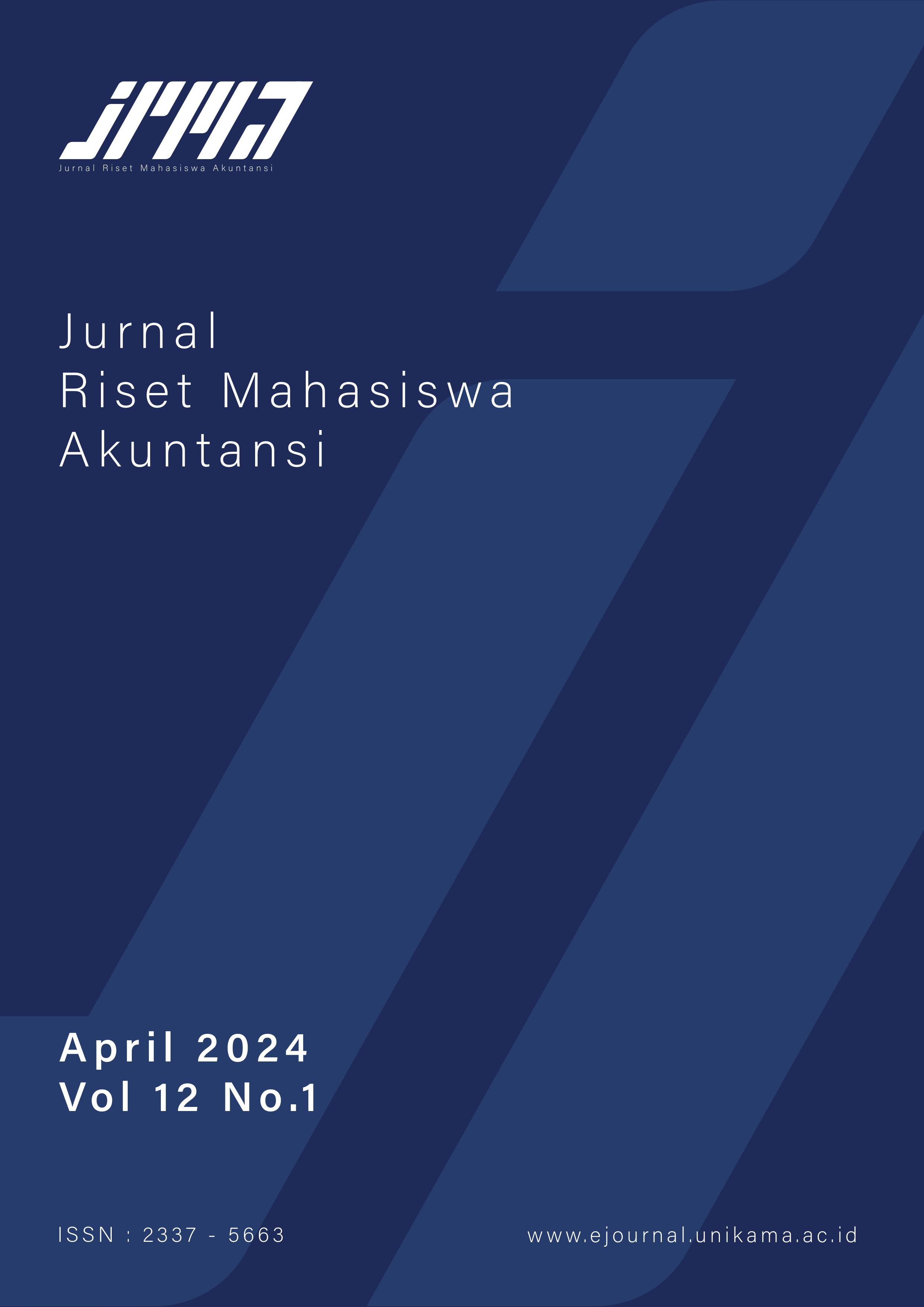The Moderating Effect of female director on the relationship between CSR and company performance: Evidence in from Indonesian Transportation Sector
Abstract
The current study investigates how female director moderates the relationship between CSR and company performance of transportation firms in Indonesia. Drawing on stakeholder theory and using data of Indonesian’s Transportation listed companies over the period 2019–2022, we examine the association between CSR, female director, and company performance. Particularly, we investigate whether CSR and female director contributes to improving company performance, and whether the relationship between CSR and company performance is moderated by female director. Our empirical findings suggest that firms with effective CSR exhibit company performance. The results also indicate that female director is positively associated with company performance. furthermore, the findings reveal that the positive relationship between CSR and company performance is negatively moderated by female director. Consequently, the study sheds light on female director, corporate social responsibility, and company performance from both a theoretical and empirical standpoint. The advantages of having female director and the possible impact of participating in CSR reporting should be known to regulators and stakeholders.
References
Achkar, J., & Bouri, E. (2021). Female empowerment/participation in the workplace and firm performance: a study of privately-owned firms. International Journal of Productivity and Performance Management, 70(8), 2149–2162. https://doi.org/10.1108/IJPPM-04-2020-0166
Adams, R. B. (2016). Women on boards: The superheroes of tomorrow? Leadership Quarterly, 27(3), 371–386. https://doi.org/10.1016/j.leaqua.2015.11.001
Agustin, G., & Onasis, D. (2021). Pengaruh Profitabilitas, Inflasi, Kurs, Suku Bunga, Pertumbuhan Ekonomi Terhadap Harga Saham Selama Pandemi Covid-19 Pada Perusahaan Sub Sektor Transportasi Yang Terdaftar Di Bursa Efek Indonesia. SENKIM: Seminar Nasional Karya Ilmiah Multidisiplin, 1(1), 276–283.
Alfianah, W., & Dianawati, W. (2020). The effect of corporate sustanaibility on financial performance in cosmetic comestic listed in indonesia stock exchange. Hamdard Islamicus, 43(S.2), 1472–1488.
Arvanitis, S. E., Varouchas, E. G., & Agiomirgianakis, G. M. (2022). Does Board Gender Diversity Really Improve Firm Performance? Evidence from Greek Listed Firms. Journal of Risk and Financial Management, 15(7). https://doi.org/10.3390/jrfm15070306
Assenga, M. P., Aly, D., & Hussainey, K. (2018). The impact of board characteristics on the financial performance of Tanzanian firms. Corporate Governance (Bingley), 18(6), 1089–1106. https://doi.org/10.1108/CG-09-2016-0174
Bartov, E., & Marra, A., Momenté, F. (2021). Corporate social responsibility and the market reaction to negative events: Evidence from inadvertent and fraudulent restatement announcements. The Accounting Review, 96(2), 81–106.
Bondarenko, T. G., Isaeva, E. A., & Orekhov, S. A., Soltakhanov, A. U. (2017). Optimization of the company strategic management system in the context of economic instability. European Research Studies Journal, XX(2B), 3–24.
Brahma, S., Nwafor, C., & Boateng, A. (2021). Board gender diversity and firm performance: The UK evidence. International Journal of Finance & Economics, 26(4), 5704–5719.
Buallay, A., Hamdan, A., & Zureigat, Q. (2017). Corporate governance and firm performance: evidence from Saudi Arabia. Australasian Accounting, Business and Finance Journal, 11(1), 78–98. https://doi.org/10.14453/aabfj.v11i1.6
Busch, T., & Friede, G. (2018). The robustness of the corporate social and financial performance relation: A secondâ€order metaâ€analysis. Corporate Social Responsibility and Environmental Management, 25(4), 583–608.
Carter, D. A., Simkins, B. J., & Simpson, W. G. (2003). Corporate governance, board diversity, and firm value. The Financial Review, 38(1), 33–53. https://doi.org/10.1111/1540-6288.00034
Cavaco, S., Challe, E., Crifo, P., Rebérioux, A., & Roudaut, G. (2016). Board independence and operating performance: analysis on (French) company and individual data. Applied Economics, 48(52), 5093–5105. https://doi.org/10.1080/00036846.2016.1170936
Chin, W. W. (1998). The partial least squares approach to structural equation modeling. In G. A. Marcolideus (Ed.), Modern Methods For Business Research (pp. 295–336). Psychology Press. https://books.google.com.my/books?hl=en&lr=&id=EDZ5AgAAQBAJ&oi=fnd&pg=PA295&ots=48xB4ss2fn&sig=qCMYG9j1v42GSIbD2aGMzY3NeKE&redir_esc=y#v=onepage&q&f=false
Christiansen, L. E., Lin, H., Pereira, M. J., Topalova, P., & Turk, R. (2016). Gender diversity in senior positions and firm performance: Evidence from Europe (WP/16/50).
Cooke, T. E. (1989). Disclosure in the corporate annual reports of Swedish companies. Accounting and Business Research, 19(74), 113–124.
Cutolo, D., Hargadon, A., & Kenney, M. (2021). Competing on platforms. MIT Sloan Management Review.
Devie, D., Liman, L. P., Tarigan, J., & Jie, F. (2020). Corporate social responsibility, financial performance and risk in Indonesian natural resources industry. Social Responsibility Journal, 16(1), 73–90. https://doi.org/10.1108/SRJ-06-2018-0155
Dimitriou, D. J. (2020). Evaluation of corporate social responsibility performance in air transport enterprise. Journal of Public Administration and Governance, 10(2), 261–278. https://doi.org/doi 10.5296 jpag v 10 i 2 16 6 45
Fabiani, F., & Breliastiti, R. (2020). Corporate governance, corporate social responsibility and financial performance, CGPI award in Indonesia. Proceeding of the International Conference on Management, Accounting, and Economy (ICMAE2020), 151, 18–22. https://doi.org/10.2991/aebmr.k.200915.005
Freeman, R. E. (1984). Strategic management: A stakeholder approach. In Freeman Edward (Vol. 1). Pitman Publishing Inc. https://doi.org/10.2139/ssrn.263511
Freeman, R. E., Dmytriyev, S. D., & Phillips, R. A. (2021). Stakeholder theory and the resource-based view of the firm. 47(7), 1757–1770.
Ghaderi, Z., Mirzapour, M., Henderson, J. C., & Richardson, S. (2019). Corporate social responsibility and hotel performance: A view from Tehran, Iran. Tourism Management Perspectives, 29(May 2018), 41–47. https://doi.org/10.1016/j.tmp.2018.10.007
Gordini, N., & Rancati, E. (2017). Gender diversity in the Italian boardroom and firm financial performance. Management Research Review, 40(1), 75–94. https://doi.org/10.1108/MRR-02-2016-0039
Gray, R., Owen, D., & Adams, C. (1996). Accounting and Accountability: Changes and challenges in corporate social and environmental reporting (First Edit). Prentice Hall.
Hair Jr, J. F., Sarstedt, M., Ringle, C. M., & Gudergan, S. P. (2018). Advanced issues in partial least squares structural equation modeling. Sage Publications, Inc.
Hasan, I., Kobeissi, N., Liu, L., & Wang, H. (2018). Corporate social responsibility and firm finacial performance: the mediating role of productivity. Journal of Business Ethics, 149(3), 671–688. https://doi.org/10.1007/s10551-016-3066-1
Henseler, J., Ringle, C. M., & Sarstedt, M. (2015). A new criterion for assessing discriminant validity in variance-based structural equation modeling. Journal of the Academy of Marketing Science, 43(1), 115–135. https://doi.org/10.1007/s11747-014-0403-8
Hou, T.-T. (2018). The relationship between corporate social responsibility and sustainable financial performance: firm-level evidence from Taiwan. Corporate Social Responsibility and Environmental Management, 25(August 2017), 1–10. https://doi.org/10.1002/csr.1647
Joecks, J., Pull, K., & Scharfenkamp, K. (2023). Women directors, board attendance, and corporate financial performance. Corporate Governance: An International Review, March, 1–23.
Kahloul, I., Sbai, H., & Grira, J. (2022). Does Corporate Social Responsibility reporting improve financial performance? The moderating role of board diversity and gender composition. Quarterly Review of Economics and Finance, 84, 305–314. https://doi.org/10.1016/j.qref.2022.03.001
Kamardin, H., Latif, R. A., Mohd, K. N. T., & Adam, N. C. (2014). Multiple Directorships and the Monitoring Role of the Board of Directors: Evidence from Malaysia. Jurnal Pengurusan, 42, 51–62.
Kao, E. H., Yeh, C. C., Wang, L. H., & Fung, H. G. (2018). The relationship between CSR and performance: Evidence in China. Pacific-Basin Finance Journal, 51(October), 155–170.
Kim, K., Watkins, K. E., & Lu, Z. (Laura). (2017). The impact of a learning organization on performance: Focusing on knowledge performance and financial performance. European Journal of Training and Development, 41(2), 177–193. https://doi.org/10.1108/EJTD-01-2016-0003
Kweh, Q. L., Ahmad, N., Ting, I. W. K., Zhang, C., & Hassan, H. Bin. (2019). Board gender diversity, board independence and firm performance in malaysia. Institutions and Economies, 11(2), 1–20.
Kyaw, K., Olugbode, M., & Petracci, B. (2017). Can board gender diversity promote corporate social performance? Corporate Governance (Bingley), 17(5), 789–802. https://doi.org/10.1108/CG-09-2016-0183
Lee, K. J. (2019). The effects of social responsibility on company value: a real options perspective of Taiwan companies. Economic Research-Ekonomska Istrazivanja , 32(1), 3835–3852. https://doi.org/10.1080/1331677X.2019.1679213
Li, K., Khalili, N. R., & Cheng, W. (2019). Corporate social responsibility practices in China: Trends, context, and impact on company performance. Sustainability, 11(2), 354. https://doi.org/doi:10.3390/su11020354
Li, Y., de Villiers, C., Li, L. Z., & Li, L. (2022). The moderating effect of board gender diversity on the relation between corporate social responsibility and firm value. Journal of Management Control, 33(1), 109–143. https://doi.org/10.1007/s00187-022-00334-x
Lin, W. L., Ho, J. A., Ng, S. I., & Lee, C. (2020). Does corporate social responsibility lead to improved firm performance? The hidden role of financial slack. Social Responsibility Journal, 16(7), 957–982. https://doi.org/10.1108/SRJ-10-2018-0259
Loukil, N., Yousfi, O., & Yerbanga, R. (2019). Does gender diversity on boards influence stock market liquidity? Empirical evidence from the French market. Corporate Governance (Bingley), 19(4), 669–703. https://doi.org/10.1108/CG-09-2018-0291
Maqbool, S., & Zameer, M. N. (2018). Corporate social responsibility and financial performance: An empirical analysis of Indian banks. Future Business Journal, 4(1), 84–93. https://doi.org/10.1016/j.fbj.2017.12.002
MartÃnezâ€Ferrero, J., & Friasâ€Aceituno, J. V. (2015). Relationship between sustainable development and financial performance: international empirical research. Business Strategy and the Environment, 24(1), 20–39.
MetadataWorldbank, Retrievedformhttps://databank.worldbank.org/metadataglossary/indonesia-database-for-policy-and-economic-research/series/NA.GDP.TRAN.COMM.KR.
Nguyen, T. M. P., Tran, Q. B., Do, D. T., & Tran, D. L. (2020). Impact of corporate social responsibility toward employees on business performance: The case of Vietnam. Uncertain Supply Chain Management, 8(3), 589–598. https://doi.org/10.5267/j.uscm.2020.2.004
Nurdiono, N., Warganegara, D. S., Aripin, A., Zahron, A., Mirfazli, E., Jose, L. S., & Georgieva, D. V. (2019). CSR disclosure impact on corporate market performance of indonesia listed companies (IDX) in trade sectors. Academy of Accounting and Financial Studies Journal, 23(Special Issue 1), 1–10.
Orazalin, N., & Baydauletov, M. (2020). Corporate social responsibility strategy and corporate environmental and social performance: The moderating role of board gender diversity. Corporate Social Responsibility and Environmental Management, 27(4), 1664–1676. https://doi.org/10.1002/csr.1915
Papangkorn, S., Chatjuthamard, P., Jiraporn, P., & Chueykamhang, S. (2021). Female directors and firm performance: Evidence from the Great Recession. International Review of Finance, 21(2), 598–610. https://doi.org/10.1111/irfi.12275
Pham, T. N., Tran, P. P., Le, M. H., Vo, H. N., Pham, C. D., & Nguyen, H. D. (2022). The effects of ESG combined ccore on business performance of enterprises in the transportation industry. Sustainability, 14, 8354. https://doi.org/https://doi.org/10.3390/su14148354
Puncheta-MartÃnez, M. C., & Gallego-Alvarez, I. (2019). Do board characteristics drive firm performance ? An international perspective. Review of Managerial Science, February, 1–47. https://doi.org/10.1007/s11846-019-00330-x
Qiu, S. (Charles), Jiang, J., Liu, X., Chen, M. H., & Yuan, X. (2021). Can corporate social responsibility protect firm value during the COVID-19 pandemic? International Journal of Hospitality Management, 93(June 2020), 102759. https://doi.org/10.1016/j.ijhm.2020.102759
Rajagopal, & Behl, R. (2018). Effect of board diversity and corporate governance structure on operating performance: Evidence form the Nepales enterprises. In Business Governance and Society: Analyzing Shifts, Conflicts, and Challenges (pp. 421–442). https://doi.org/10.1007/978-3-319-94613-9
Saleh, M. W. A., Zaid, M. A. A., Shurafa, R., Maigoshi, Z. S., Mansour, M., & Zaid, A. (2020). Does board gender enhance Palestinian firm performance? The moderating role of corporate social responsibility. Corporate Governance (Bingley), 21(4), 685–701. https://doi.org/10.1108/CG-08-2020-0325
Saukkonen, N., & Kirjavainen, J. (2019). Business environment - emerging external and internal pressures for sustainable production. https://doi.org/https://doi.org/10.1007/978-3-319-71062-4_1-1
Scholtz, H., & Kieviet, S. (2017). The influence of board diversity on company performance of south african companies. Journal of African Business, 19(1), 105–123. https://doi.org/10.1080/15228916.2017.1356065
Setyowati, A., Bany-Ariffin, A. N., Kamarudin, F., & Matemilola, B. T. (2023). Role of women board members in the relationship between internal CSR and firm efficiency: Evidence from multiple countries. Cogent Business and Management, 10(1). https://doi.org/10.1080/23311975.2023.2173048
Singh, A., & Chakraborty, M. (2021). Does CSR disclosure influence financial performance of firms? Evidence from an emerging economy. Sustainability Accounting, Management and Policy Journal, 12(4), 788–810. https://doi.org/10.1108/SAMPJ-02-2018-0042
Tulung, J. E., & Ramdani, D. (2018). Independence, size and performance of the board: An emerging market research. Corporate Ownership and Control, 15(2), 201–208. https://doi.org/10.22495/cocv15i2c1p6
Ullah, I., Fang, H., & Jebran, K. (2019). Do gender diversity and CEO gender enhance firm’s value? Evidence from an emerging economy. Corporate Governance (Bingley), 20(1), 44–66. https://doi.org/10.1108/CG-03-2019-0085
Velte, P. (2021). Meta-analyses on corporate social responsibility (CSR): a literature review. Management Review Quarterly, 1–49. https://doi.org/10.1007/s11301-021-00211-2
Yoon, B., & Chung, Y. (2018). The effects of corporate social responsibility on firm performance: A stakeholder approach. Journal of Hospitality and Tourism Management, 37(August), 89–96. https://doi.org/10.1016/j.jhtm.2018.10.005
Zhao, Y., Von Delft, S., Morgan-Thomas, A., & Buck, T. (2020). The evolution of platform business models: Exploring competitive battles in the world of platforms. Long Range Planning, 53(4), 101892. https://doi.org/https://doi.org/10.1016/j.lrp.2019.101892










